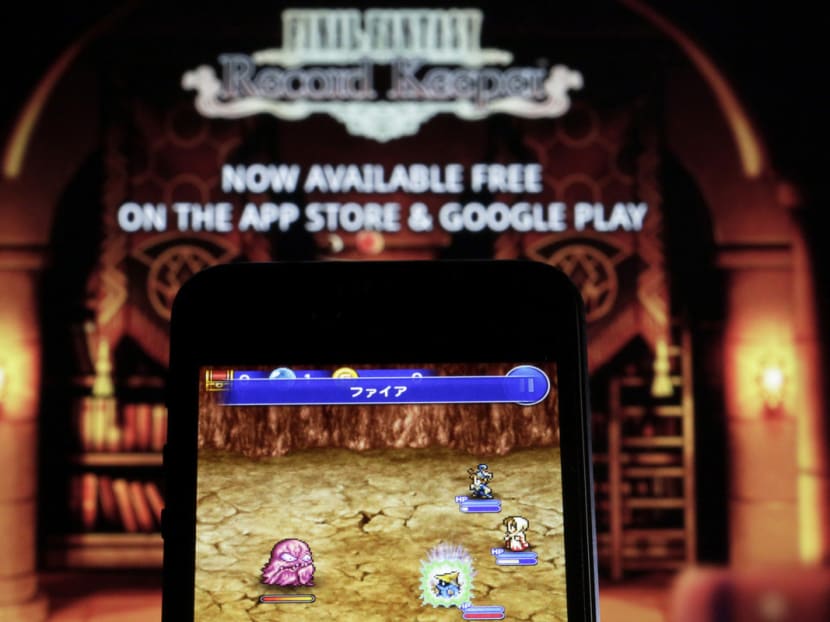Revealed: Secret strategies of the world's most lucrative apps
TOKYO — A few months ago, Mr Yoshiki Watabe, a producer at Japan's DeNA, was looking to draw attention for the company's hit mobile game. He introduced a spiky-haired hero armed with an out-sized sword — then gave players a mere four days to bring down an evil mega-corporation.

The Final Fantasy Record Keeper (FFRK) smartphone game, co-developed by Square Enix and DeNA. Photo: Bloomberg
TOKYO — A few months ago, Mr Yoshiki Watabe, a producer at Japan's DeNA, was looking to draw attention for the company's hit mobile game. He introduced a spiky-haired hero armed with an out-sized sword — then gave players a mere four days to bring down an evil mega-corporation.
It worked. Final Fantasy Record Keeper climbed in download and revenue rankings. It is an example of how Japanese publishers have become the best in the world at making money from free mobile games. They use psychology, art and big data to get customers to come, play and pay for digital extras like weapons or skills.
"It's bit like running a bar," said Mr Watabe, head of the company's so-called live ops. "You're always on, hustling to get the customers in and to keep them happy. Otherwise you have no business."
Smartphone games, unlike traditional video titles, don't come as a completed product. What you download has a simple mechanic for play, like manipulating sweets in Candy Crush or toppling towers in Angry Birds. That is the foundation on which people like Mr Watabe build new narratives, characters and play modes.
From Tokyo, teams at DeNA, GungHo Online Entertainment and other companies watch players around the world to see what's catching on or falling flat. They roll out new features when things get dull and, just as importantly, ease up when things are too crazy.
50 QUANTS
DeNA may be the most quantitative of the bunch. It uses about 50 data analysts to track engagement by looking at metrics such as daily-active-user and return-rate numbers, as well as how people play after they log in. The data helps veterans like Mr Watabe figure out how to keep users from getting bored.
It is a puzzle of many interrelated pieces. Mr Watabe's team divides users into segments depending on their level, then tracks their play to see how difficulty and rewards such as weapons and armour affect participation.
A player logging in after a long absence may receive a welcome-back gift, a practice common in the industry. The user is typically greeted with a list of current events offering prizes, rare weapons or access to new characters. Completing the quests often requires spending in-game currency.
"These games are not really products in the way traditional packaged titles are, but rather service operations," said Mr Takuto Takizawa, Japan country director for industry researcher App Annie. "All of Japan's top-earning games make their money this way."
GUNGHO WAY
GungHo, whose Puzzle & Dragons is the world's second-best earning mobile title, has only one data analyst on staff and is less numbers-focused than DeNA. Instead, it taps into social media and real-world events, relying on intuitive techniques honed over a decade of running online computer games.
Its live ops are centred on the release of new levels, or dungeons, that offer playable monster characters as prizes. Events can last a week or only 24 hours and those bearing the rarest rewards appear at irregular intervals.
GungHo is also a prolific collaborator, with characters from Hello Kitty and Batman to Angry Birds making cameos in its special dungeons.
"Numbers like average revenue per user, retention and monetisation rates are of more interest to our marketing folks," said Mr Hiroyuki Hashimoto, a general manager in charge of the president's office at GungHo. "For the operations team, it's a combination of listening to users' opinions and trusting their gut feeling."
MONEY GAME
The approach works. Puzzle & Dragons generated US$1.3 billion (S$1.83 billion) for GungHo last year. Half of the top 10 mobile game publishers worldwide ranked by revenue in 2014 were Japanese, even though only one made the list ordered by number of downloads, according to App Annie.
The reason Japanese companies can generate so much revenue from free games is because monetisation is built into play. Say you are making your way through a Puzzle & Dragons dungeon, defeating baddies and collecting rewards, only to be bested by the final boss. The game-over screen will offer a choice of paying to continue or losing all the loot and time invested.
Puzzle & Dragons and Mixi’s Monster Strike, which ranked fourth in the world by revenue last year, allow players to form parties to defeat difficult bosses, adding an aspect of peer pressure. Other mechanics include charging users for inventory space and making progress without pay difficult.
PAY-TO-WIN
The challenge is keeping free-to-play from degenerating into pay-to-win, said Mr Ramin Shokrizade, a former game economist at Wargaming. Aggressive monetisation is the number one reason gamers stop playing, according to a report by Electronic Entertainment Design and Research.
"Free-to-play can be abused, but as a tool it's here to stay," said Mr Shokrizade, who is also an adviser to International Consumer Protection Enforcement Network.
GungHo already intentionally caps earnings per user when spending gets out of hand, President Kazuki Morishita said. While Puzzle & Dragons failed to capture overseas audiences, the company is now offering its live ops formula to third-party developers worldwide.
DeNA's approach received a vote of confidence when Nintendo earlier this year chose it as partner for Mario's smartphone debut. The two companies will release the service in Japan as early as next month.
"Our competition is not just other games, but other also social and curation services like Facebook and Twitter," DeNA's Mr Watabe said. "When you open your smartphone on the train or in a boring meeting, which icon will you press?" BLOOMBERG





